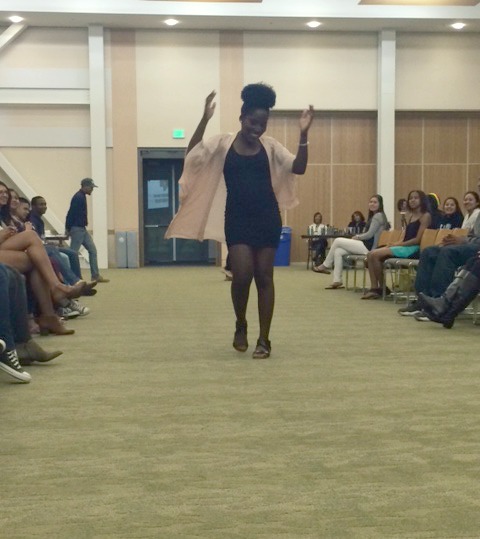By Ciara Walker
Staff Writer
How many of you have wondered if your black female classmate cut her hair whenever she wore it curly and suddenly her tresses shrunk several inches?
What about judging the texture – does it feel as soft as it looks? Does it stink? What exactly is holding that afro together? Why put smoothies (hair concoction of different kitchen ingredients usually for deep conditioning/moisturizing) in your hair – doesn’t it make its own oil? Is she wearing a weave (as if she can’t grow long, healthy hair)? What is good hair? What is bad hair?
These are some of the questions and unspoken concerns that were addressed via a student-led panel of seven women and one man.
BSU President Akilah Green had this vision for a little over a year, simply wanting to persuade more people to embrace natural beauty and what better way than to show off the many different types of kinks and curls? The panel on Feb. 10 included a natural hair show where each model was introduced, as well as their hair motto, which centered on self-love and acceptance.
Brianna Cordova says that her natural hair journey helped her to find her identity because she can be free and feel beautiful. She said that she is comfortable in the skin she’s in through her hair because once she accepted her naps, she accepted herself. “Nappy” is a term originally coined to describe kinky hair that used to have a negative connotation, but now it is more frequently associated with a more positive message. People are actually happy to be nappy. Mikal Davis says that his hair has become his icon because it is an identifier. People recognize him close and afar just from his hair. He said that embracing his natural hair is difficult and managing it is time consuming. However, it’s worth it because he loves his hair.
Hair journeys and regimens were shared. A video of interviews of people from around campus shed light on the misconceptions of good and bad hair. They were also asked to think about how companies target a certain demographic through their marketing. Unless it’s a product specific to “ethnic hair care” then you don’t usually see an African American woman being featured on the commercial.
A brief clip of some of the models candidly talking amongst each other about their hair was also played. There was spoken word, laughter and it drew a very diverse audience. Most importantly, what seemed to be the central theme of loving yourself from the crown of your head, was repeatedly reiterated.
Although, I am against perming (chemically altering my natural hair) and I rarely use heat, I want to stress that there is nothing wrong if you choose to do either. The problem is if you are doing solely because society teaches that is the only way to be beautiful. Or you are doing so because you don’t like your natural self – that’s more of a self-esteem issue as opposed to hairstyle preference. My personal message about embracing your natural beauty is to make sure that behind the layers of makeup, underneath the tracks of weave/hair extensions, without your fly outfit, even on a bad hair day….love who you are. Don’t feel inadequate just because you don’t have to fit into the prototype of mainstream beauty. Don’t worry if your big, beautiful afro makes others uneasy – relax. Pun intended.


